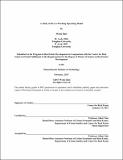| dc.contributor.advisor | Albert Saiz. | en_US |
| dc.contributor.author | Zhai, Wensi | en_US |
| dc.contributor.other | Massachusetts Institute of Technology. Center for Real Estate. Program in Real Estate Development. | en_US |
| dc.date.accessioned | 2017-05-11T19:05:55Z | |
| dc.date.available | 2017-05-11T19:05:55Z | |
| dc.date.copyright | 2017 | en_US |
| dc.date.issued | 2017 | en_US |
| dc.identifier.uri | http://hdl.handle.net/1721.1/108832 | |
| dc.description | Thesis: S.M. in Real Estate Development, Massachusetts Institute of Technology, Program in Real Estate Development in conjunction with the Center for Real Estate, 2017. | en_US |
| dc.description | This electronic version was submitted by the student author. The certified thesis is available in the Institute Archives and Special Collections. | en_US |
| dc.description | Cataloged from student-submitted PDF version of thesis. | en_US |
| dc.description | Includes bibliographical references (page 64). | en_US |
| dc.description.abstract | After explosive development in the past half decade, the co-working industry is seeking changes to enhance the sustainability of its business model. Despite early success, the buy-bulk-sell-piece model does not promise a high return today due to the increasing cost of rent. Floating revenue and high fixed cost make the model fundamentally risky, imposing challenges for co-working companies to withstand the next recession. In the face of intensifying competition, major co-working players are expanding their businesses aggressively, aiming to benefit from economies of scale. The demand for funds is greater and more urgent than ever. Aside from commercial loans and venture capital, co-working companies are seeking more flexible and sustainable financing sources for growth. On the supply side, traditional real estate companies now have fewer doubts and greater interest in participating in the co-working business. While a small group have chosen to start their own spaces, more are looking for strategic cooperation with co-working players that have proven track records. This thesis conducted a study of the co-working operating model in an attempt to elucidate the optimal solution that benefits both sides of the business. Following a brief industry overview, it discusses the revenue and cost structure of the co-working space and the pros and cons of five co-working operating models. With that understanding, it constructs a DCF model of a mock-up co-working project and develops cash flows for both participants to analyze their return and risk profile under each operating model. The results suggest that the joint venture model is the optimal solution for co-working companies in business expansion, and property owners with passive investment positions. Further, the management model is the best choice for more matured co-working companies with strong brand influence and concentration on management service. It also indicates that the transformation from the lease model to the management and franchise model requires co-working companies to have a strong brand, proven track record, and an established member network. While for property owners, such transformation depends on its willingness of exposure to the co-working business, as well as the capital cost, risk tolerance, and investment horizontal. | en_US |
| dc.description.statementofresponsibility | by Wensi Zhai. | en_US |
| dc.format.extent | 64 pages | en_US |
| dc.language.iso | eng | en_US |
| dc.publisher | Massachusetts Institute of Technology | en_US |
| dc.rights | MIT theses are protected by copyright. They may be viewed, downloaded, or printed from this source but further reproduction or distribution in any format is prohibited without written permission. | en_US |
| dc.rights.uri | http://dspace.mit.edu/handle/1721.1/7582 | en_US |
| dc.subject | Center for Real Estate. Program in Real Estate Development. | en_US |
| dc.title | A study of the co-working operating model | en_US |
| dc.type | Thesis | en_US |
| dc.description.degree | S.M. in Real Estate Development | en_US |
| dc.contributor.department | Massachusetts Institute of Technology. Center for Real Estate. Program in Real Estate Development. | en_US |
| dc.contributor.department | Massachusetts Institute of Technology. Center for Real Estate | |
| dc.identifier.oclc | 986240784 | en_US |
